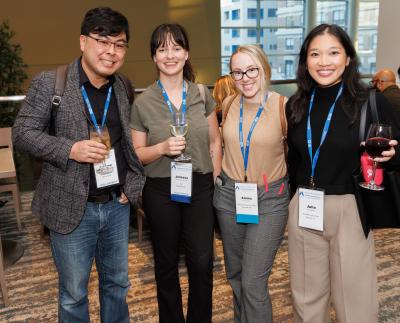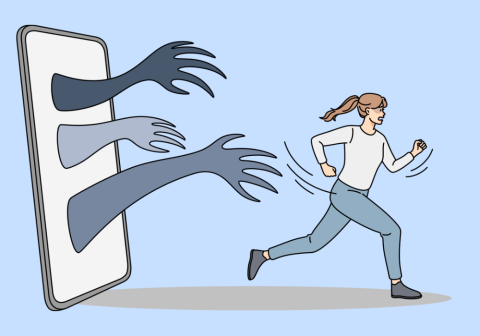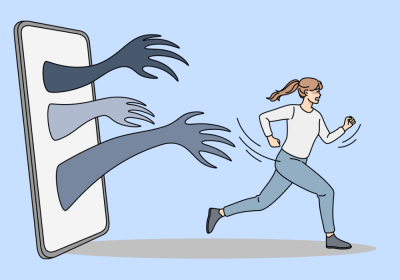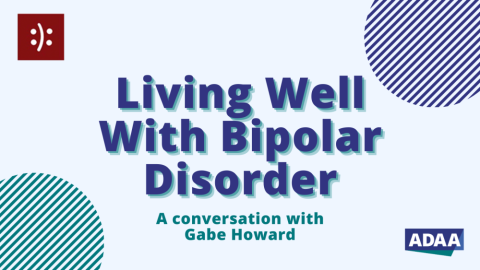
Discover resources to help mental health early career professionals and students (typically defined as 5 years post degree attainment) gain the knowledge and skills needed to launch successful careers in the mental health sector. Learn tips to succeed on a first job application, how to publish research, expand your network and more.
Get Involved with ADAA
ADAA is the only multidisciplinary mental health professional organization engaging the world’s leading experts, students, and early career professionals who are in clinical practice or conduct research on anxiety, depression, and co-occurring disorders. Our membership community can help you get to the next step in your professional career.
- Learn about ADAA's membership benefits. Students and early career professionals receive a special rate when they join. Become an ADAA member today!
- Learn more about the Career Development Leadership Program and apply today!
 Join the ADAA Early Career Professionals and Student Special Interest Group (ECP/S SIG)
Join the ADAA Early Career Professionals and Student Special Interest Group (ECP/S SIG)- Making the Most of the ADAA Conference with Anastasia Rose
This SIG unites students and early career professionals interested in the clinical treatment and research of anxiety and depression. The group develops ADAA conference activities organized around topics specifically relevant to students and early career professionals, and offers an initial avenue for students and early career professionals to become involved in ADAA.
- ECP/S SIG Resources:
In 2023, a survey was distributed to our ECP/S SIG members to determine their personal takes on (1) why they chose their specific mental health degree path, (2) how they viewed the differences between the degree/license they obtained versus the alternatives, and (3) advice they would give to persons interested in pursuing a mental health career.
Click on the tabs below to discover more about Master of Social Work (MSW) and Doctor of Philosophy (PhD) or Doctor of Psychology (PsyD) degrees and whether these are right for you.
To learn more about the differences among mental/behavioral/community health programs, we encourage you to start by exploring ADAA's resources and the external links under the 'Other Resources' tabs. Read more about the ECP/S SIG survey here.
Have a question about ADAA membership? Email: [email protected]
ADAA Awards Programs + −
Many of the annual ADAA Awards Programs celebrate emerging mental health leaders. Applications are open to students and early career professionals. You do not need to be a member to apply. Learn more: Awards Programs.
Alies Muskin Career Development Leadership (CDLP) Program
- Annual leadership award for early career professionals. Includes a full day at the annual conference of mentoring, networking and learning as well as one year of complimentary membership, free conference registration and a $500 cash award.
BIPOC Membership Scholarship Program
- Annual membership scholarships to students and early career professionals who identify as members of the BIPOC community. Discounted conference registration provided.
Donald F. Klein Early Career Investigator Award
- Funded annual awards to early career investigators for the best original research paper on neurobiology, psychopharmacology, psychosocial treatments, or experimental psychopathology of anxiety disorders and depression. A $500 award, free annual membership, and free conference registration is provided.
- Awards offered to the best posters presented at the ADAA Annual Conference in several categories.
ADAA Early Career Professionals & Students SIG + −
Unites students and early career professionals interested in the clinical treatment and research of anxiety and depression. The group develops ADAA conference activities organized around topics specifically relevant to students and early career professionals, and offers an initial avenue for students and early career professionals to become involved in ADAA. Early Career is typically defined as 5 years post degree attainment. Are you an ADAA member and interested in joining the SIG? Email:[email protected]
Why Join the Early Career SIG?
- Unparalleled networking opportunities,
- Learn and share ideas in a welcoming space,
- Engage in Professional Development, including honing your leadership skills;
- Share your expertise; and
- Share Opportunities
SIG Co-Chairs:
- Rachel Lippin-Foster, LMSW
- Ashley Howell, PhD
SIG Co-Vice Chairs:
- Lana Ruvolo Grasser, PhD
- Alnardo Martinez, LMHC
Chair Emeritus: Lillian Reuman, PhD, Olivia Bogucki, PhD, Stephanie Woodrow, LCPC, NCC; Ashley Clausen, PhD; Krystal Lewis, PhD; Amanda Baker, PhD; Alex Bettis, PhD; Elle Brennan, PhD; Gopalkumar Rakesh, MD
Board Liaison
- Alison LoPilato, PhD, ABPP
ADAA Early Career/Student Mental Health Resources + −
Pages:
- Join the Early Career Professionals and Student Special Interest Group
- Mental Health Career Center
- ADAA Journal of Mood & Anxiety Disorders TM
- Sign up to receive ADAA's Professional newsletter Insights
- Find Your Therapist
- ADAA Member's Books & Publications
- ADAA Members in the News
- ADAA Awards Programs
- ADAA Content for Clients/the Public
- DEI Resources
Blogs:
- Succeeding in Your First Job Application, Part 1, Part 2, Part 3
- Professional Growth | ADAA Member Benefits
- Opening a Private Practice
- Five Tips for DEI as a Graduate Student or Trainee with a Marginalized Identity
- Are You Getting the Most of ADAA’s Resources for Your Clients?
- Strategies and Tips for Writing a Successful Conference Submission
- Navigating the Telehealth Terrain: Recognizing the Limits and Knowing When to Pivot to In-Person Care
- Understanding Levels of Care in Mental Health Treatment
- Submit a blog for consideration
Webinars:
- Time and Self Management in a Distracting World
- Navigating Your Path to Success - Q&A
- Keeping Imposter Syndrome at Bay: Using Social Media and Other Creative Tools to Build Mentorship and Confidence as an Early Career Professional
- Tips for Publishing Your Research
- The Myth of "Having it All"
- Submit a webinar for consideration
ADAA Annual Conference
ADAA hosts an annual conference where clinicians and researchers from across the US and around the world came together to improve treatments and find cures for anxiety, depression, and co-occurring disorders. Attend ADAA's Annual Conference, submit an an award application (open to members and non-members), sign up to receive conference updates, and submit a session or poster to present at the conference.
Early Career Template Package + −
The Early Career SIG put together helpful template materials for both clinical and research early career professionals. View/download the template materials below:
What is a Master of Social Work (MSW)? + −
What is a Master of Social Work (MSW)?
An MSW is a broad degree that involves learning about individuals and how to help them on both a micro, macro, and mezzo level. Individuals with an MSW can have a variety of jobs including, but not limited to, individual clinical providers in a variety of treatment settings (e.g., assessment, treatment planning, and interventionist), clinical supervisors, trainers and professors, programmatic director, care coordinators, researcher, consultant, speaker, social justice advocates, and policymakers.
As a MSW, to provide therapy, an individual takes licensing tests. They then need to practice under a supervisor until they are eligible to sit for a second level licensing exam. Details vary by state.
Why did you decide to pursue your degree? Why did you choose this degree over the other available pathways (e.g., Social Work, Counseling, Psychiatry, Psychology)?
Individuals choose an MSW program for a variety of reasons, including length of program, accessibility (e.g., financial and geographical), and flexible program structure.
“I was in a psychology graduate program but was not interested in testing or research, so I left to pursue an MSW where I could learn to advocate for marginalized people and develop clinical skills to help people live their best lives.” - Kimberly Morrow, LCSW
What, from your perspective, differentiates your degree from other mental health degrees?
A social work program includes a wide breadth of topics, including clinical skills, case management, advocacy, and policy development. An individual in a social work program will learn about these topics through the micro, macro, and mezzo level. Social workers also complete internships during their time in graduate school. These internships can range from inpatient mental health programs to working in geriatric care management. Those seeking to work as a clinical social worker are encouraged to seek supervision and postgraduate training to supplement what is learned in the social work program.
What advice do you wish you had when choosing which degree to pursue? and/or What advice would you like to give to individuals who are trying to choose a career path in mental health?
“Love what you do! And if you don’t, try something different! It’s ok to change your mind. Seek support, know yourself, always be open to new learning, self care is vital. Build your support network.” - Heather Greenawalt, LCSW
“I had a mentor early on who had an MSW, and she gave me great advice that this is a degree that can grow and change with you over your career. I agree completely and am grateful to her for that advice.” - Elizabeth DuPont Spencer, LCSW
What is a Doctor of Philosophy (PhD) or Doctor of Psychology (PsyD)? + −
What is a Doctor of Philosophy (PhD) or Doctor of Psychology (PsyD)?
First, there are numerous PhD (academic) programs that focus on mental and behavioral health. Some programs emphasize understanding, assessing, and treating mental health through scientist-practitioner or clinical scientist training models (e.g. Clinical, Counseling, or Educational Psychology), and some emphasize understanding biological or societal aspects of mental health that can inform assessment and intervention (e.g., Neuroscience or Public Health). PhD programs will inherently emphasize skills in conducting research, student mentorship, and teaching.
PsyD (professional) programs were developed to train students under a scholar-practitioner model, as an alternative to scientist-practitioner PhD programs. PsyD programs are an excellent option for students who aspire to primarily practice as licensed clinical psychologists.
Why did you decide to pursue your degree? Why did you choose this degree over the other available pathways?
Individuals choose a doctoral program for a variety of reasons, including a passion for highly specialized research, teaching, and/or practice.
“I felt that a doctorate in clinical psychology provided me with an advanced training in assessment, treatment, and research of mental health disorders.” - Jesse Spiegel, PsyD, Private Practice
“[I chose a PhD program] because I wanted to pursue a career that allows me to mainly conduct my research and mentor students, as well as provide therapy to patients.” - Cope Feurer, PhD, Researcher at a College or University
“I quickly realized I wasn't interested in how bones nor other body parts work, so I became disenchanted with the idea of spending 4 years in medical school to become a psychiatrist. At the same time, [...] I loved learning and uncovering new understandings about how the brain works and operates, and could see myself pursuing a career that blended both clinical and research expertise.” - Katie Bessette, PhD, Researcher at a College or University
“I enjoy working with children and families, really enjoy brain science, like the real-life application of clinical work, and wanted to have the option to do it all (practice, research, teach, train)” - Elle Brennan, PhD, Clinical Psychologist a Children’s Hospital
“I wanted to lead scientific studies that help answer the most pressing questions in the field of neuroscience and mental health. Therefore, I chose a degree that completely immersed me in the research process and allowed me to focus all of my time on science.” - Lana Ruvolo Grasser, PhD, Researcher at a Federal Agency
What, from your perspective, differentiates your degree from other mental health degrees?
A mental health-oriented doctoral program encourages specialization in certain mental health concerns. PhD programs, specifically, are unique in that they emphasize skills in conducting clinical research. APA-accredited, licensure-eligible doctoral programs emphasize specialized coursework and training in neuropsychiatric assessment, therapy fundamentals as well as specific treatment protocols for certain disorders or concerns, and biopsychosocial approaches to understanding and treating mental health disorders. Years of working with an expert mentor further enables topic specialization. Clinical/Counseling/School psychology PhD/PsyD students complete part-time clinical practica throughout graduate training and a full-time internship in a clinical setting (i.e., a year-long predoctoral residency placement). Postgraduate training may also be required for licensure (varies by state).
“The emphasis on research is the main difference [...] Other [mental health] degrees can provide training in clinical practice without such a large emphasis on the research piece.” - Cope Feurer, PhD
“[A PsyD] provides more nuanced [and specialized clinical] training than [some Master’s degrees that are shorter in duration] .” - Jesse Spiegel, PsyD
“My degree is different from many other mental health degrees because it does not have a clinical component [...]this means that my time, training, and expertise is entirely focused on research." - Lana Ruvolo Grasser, PhD (Neuroscientist)
What are the various mental health roles you can perform with your degree (e.g., professor, individual provider etc.)?
In summary, with a doctoral degree in mental health, individuals can pursue many roles in their career. This may include, but are not limited to: professor/instructor, provider at a hospital, community center, or group practice, , psychological testing, business owner, clinical supervisor,, private practice, consultant, program developer, researcher, social justice advocate, institutional administrator, industry employee, AI consultant.
What advice do you wish you had when choosing which degree to pursue? and/or What advice would you like to give to individuals who are trying to choose a career path in mental health?
“First determine the type of job or career you'd like to have [...]and from there, determine how others in that position got the training needed and which degrees they pursued. A PhD takes a lot of time, money, and energy, and is not needed for most mental health careers”. - Katie Bessette, PhD
“Advice for a degree: Be sure you are ready for the significant amount of training and studying that is needed. The educational background can be costly. [However,] if you are looking to help people with mental health difficulties then [you are on the right] path!” - Jesse Spiegel, PsyD
“I do wish that I had known about other degrees that merged both research and clinical work, like clinical psychology. Talk to a lot of different people who have different degrees and expertise to find out what really interests you and what the best fit is. {...} Be very specific in your goals and align your time towards those goals through the degree that you choose. There is something for everyone and every career!” - Lana Ruvolo Grasser, PhD
“PhDs in clinical psychology prepare one to enter the field through many paths (e.g., clinical, clinical supervision, teaching, research, administrative, industry, etc.) but take a long time and much dedicated work. I would not encourage someone just interested in clinical work to pursue this degree, but rather to start with a master's level degree.” - Elle Brennan, PhD
Other Community Resources + −
- NAMI: Types of Mental Health Professionals
- Department of Labor: Five Careers Making a Difference in Mental Health
- Mental Health America: Types of Mental Health Professionals
- A [Brief Synopsis] of Differences between a Ph.D. in Clinical Psychology and Psy.D.
- American Psychological Association: Doctoral degrees in psychology: How are they different, or not so different?
- University of Buffalo: What is Social Work and What do Social Workers Do?
















